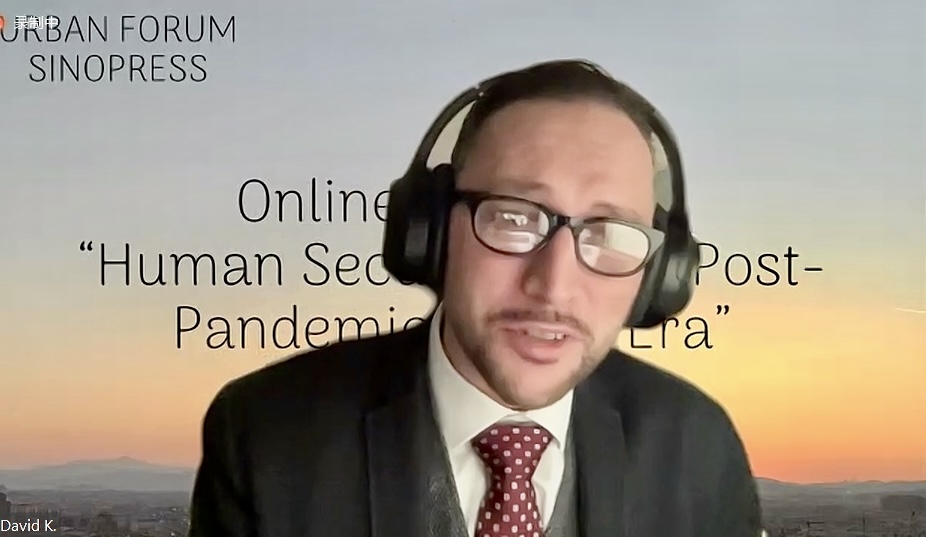
On 20. February 2023, the online forum “Human Security in the Post-Pandemic Digital Era” took place via ZOOM, an event co-organized by URBAN FORUM and SINOPRESS.
At the backdrop of this year’s Munich Security Conference, this forum aimed at an extended discussion of security issues, including human security at the AI era, Ukraine war, international cooperation in the post-Pandemic time concerning digital security, governmental use of malware, geopolitics and global economic development, observation of human security during the Pandemic time under the respective measures and policies, etc.
The panelists included Dr. Eva Sobotka (Human Rights Expert), Dr. iur. Constantin Weinstabl (Director of the Academy of Foreign Policies BSA), Mag. Robert Fitzthum (Economist), and Mag. Michael Weilguny (IT Specialist/Digital Expert). The discussion was moderated by David Kainrath, BSc, MSc.

In his observation, Dr.Weinstabl said it is common knowledge that military securities are back in the forefront of security policy discussions in today’s world. Meanwhile, for quite some time already, interest in geopolitics is excessively highlighted in shaping the world. Furthermore, nationalization movements with a lot of populism have been seen over the last few years.
Besides, there was bipolarism during the Pandemic, and thoughts on localization instead globalization. Public opinion becomes dichotomic. A more balanced position would be blamed. Diplomacy-based approach is cornered by one or even by both sides. The political situation caused by the Ukraine war is, thus, not much different from what the United States and its allies did in Iraq, or what happened in Kosovo in 1999.
Dr. Weinstabl mentioned Wang Yi, Director of the Office of the Central Foreign Affairs Commission from China. While the Western countries are discussing how they can “win” the war in Ukraine by planning to deliver more weapons to Ukraine, Wang Yi is proposing a Chinese peace plan. How big the echo from the rest of the world will be, remains a question.

Talking about human security in the post Pandemic digital area, Dr. Eva Sobotka said that it is also connected with the misuse of malware, deep fakes and so on. She traced back to history, pointing out that the traditional concept of security has been largely shaped by the Cold War, when the main concern was with the ability to counter the external threats. Today, however, the human security vision needs to consider issues such as development in the digital age, poverty eradication, social equality, as well as conflict resolution, peacebuilding, state building and so on. Humankind is also facing serious environmental challenges, global warming and millions of internally displaced persons. In this context, Dr. Sobotka said that she would still advocate and argue that despite a great deal of pushback, human rights are still the best foundation to ensure peace. She quoted “no peace without development, no development without peace, and neither peace nor development without human rights”. As a final point, she mentioned the EU’s strong regulatory work for personal data protection.
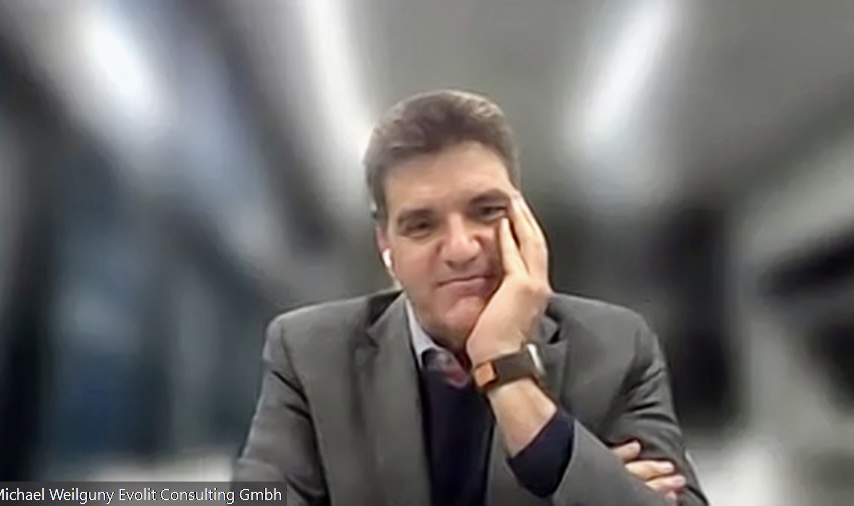
The IT expert Mag. Weilguny explained the AI technology as well as the challenges of quantum computing. It might sound scary that one day quantum computing will be everywhere, being used in the artificial intelligence algorithm like Chat GPT. It works much faster and much better, though, making calculations one can never do with normal computers. Quantum computing will require human beings to change everything to do with password security. It will for sure have a real impact in future. But quantum computing can help tremendously in positive ways, for climate change and medical development, food security, driverless cars and drone taxis, etc. More concerning is the phenomenon of digital surveillance done through malware by some governments. Education, in this respect, is the most important and a long-term way to recognize the fraud, said Mag. Weilguny. Technical fraud generates technical solution about it. It’s just a question about the solutions.
The forum also touched the question of global economic development. While Europe is talking about localization of some products like medicine, much more industry is interdependent on globalization, for instance, car industry and tourism. Mobility of skilled workers and experts are also of key importance. Unfortunately, today’s world is becoming more and more geopolitical and polarized. There is a common acknowledgement that China’s economic progress over the past 40 years has pulled millions of its citizens out of poverty, fueled global growth and benefited both developing and developed countries. At his long speech during this year’s MSC, however, an influential billionaire pictured China in a rather dark manner under its present president Xi Jinping, mentioning for example its Zero-COVID policy, its relationship with Russia, with Taiwan, and the surveillance balloon over the USA, coming to the conclusion that China won’t be a dominant military and political force it aims.
Dr. Eva Sobotka expressed her concern on the economic dependency which has become a weapon. At the same time, she saw the current world being seriously geopolitical. The Western world is indulging itself in the old order since the Cold War. In terms of systems, it feels that it holds the moral high ground. The world has changed, as a matter of fact. The West should look back on its history of imperial aggression and colonial history in Asia and Africa, for example, and concentrate on the future in the digital age to meet the new challenges brought about by energy crisis, environmental degradation, network security and artificial intelligence, said Dr. Sobotka. She pointed out that at present, food prices have skyrocketed by 40% compared to the previous two years, globally. It makes but a world of difference whether 15% or 50% of the national budget is spent on food purchases. Speaking of China, Dr. Sobotka expressed her admiration that the country’s achievements in the past 40 years are unprecedented. Being already a very powerful country, China is very confident in its own political model, and is willing to promote it to the world. There is a problem, though, about how to govern in order to better satisfy the interests of its population, she said.
Dr. Weinstabl stressed that the world is interdependent. Yet the Europeans traditionally have a value orientation of Europeanization. As a matter of fact, both Europe and the United States adopt this mindset. Over the years, the traditional Western model has emphasized democracy, freedom, capitalism, neoliberalism, etc. But the world has now other models, such as state capitalism. New forces with new alliances have emerged. The West should not think about the world in a bipolar sense but embrace the future with a diversified way of thinking. Looking back at history, Europe was also diversified in the 19th century, Dr. Weinstabl said. He indicated, too, the necessity of reflection on the consequences of colonialism, not to mention that many former colonies have now become a dominant force in the global economy. That is the reason that Europe and the United States now feel a sense of insecurity. The originally ironclad hierarchy has been challenged.
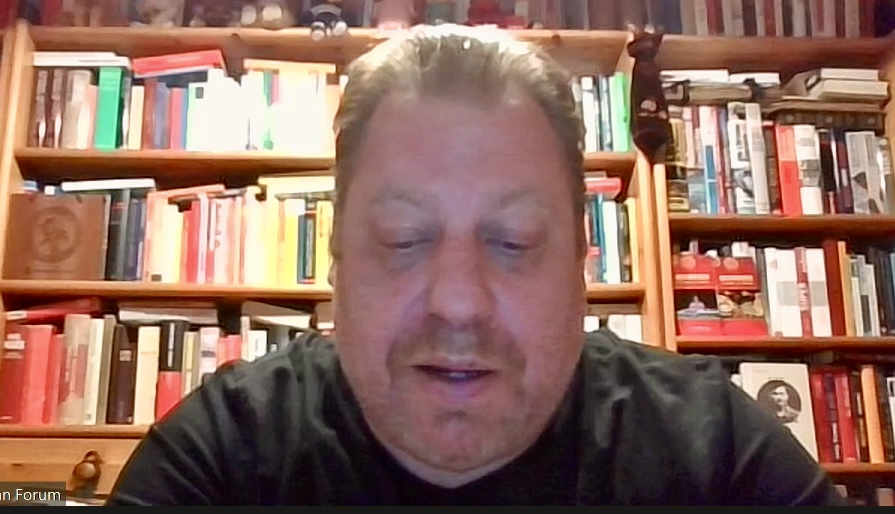
For Mag. Fitzthum (represented by Mag. Bernhard Müller), the Western politicians and the Western media’s negative sentiment towards China will directly affect the European and the American economies. For example, the special entry restrictions on Chinese people after the Pandemic and the negative voices imposed by the media on the public failed to pave the way for attracting wealthy tourists from China. The economic growth in China will be strategically generated more internally. Increasing the standard of living with a boost in demand is given top priority by the Chinese government for the future. The exports is having a stronger focus on Asia, especially the ASEAN countries and the countries of the Global South in general.
Mag. Fitzthum analyzed that by taking advantage of China’s reliance on the latest technology such as chips in order to hinder China’s development, the USA is pushing China to achieve technological independence and develop its own cutting-edge technologies more extensively and rapidly — especially in the fields of semiconductors, artificial intelligence, software, and aircraft engines. Companies such as Qualcomm, Intel, Samsung or ASML in Europe will probably not only lose the Chinese market in the future but will also face strong Chinese competition and greater price pressure in the global market.
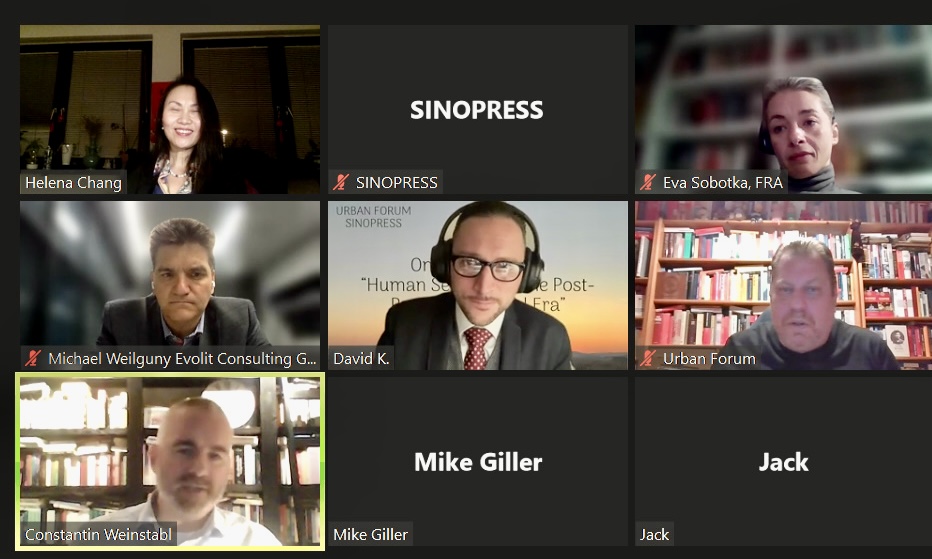
What the Europeans and the Americans should do is to hold a mutually equal attitude and to talk with each other instead of criticizing, agreed by all panelists. There are enough imminent things to do in this world, and no time left to resist, ridicule, provoke or abuse each other.
Following is a short video clip about the discussion on China:

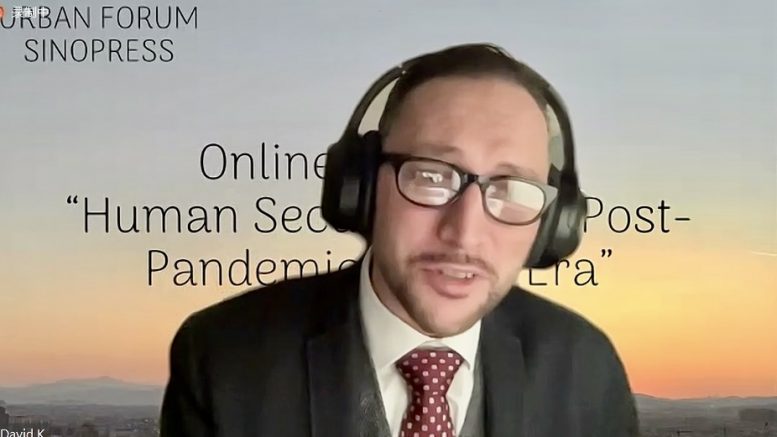
Be the first to comment on "Review of the online Forum on “Human Security in the Post-Pandemic Digital Era”"